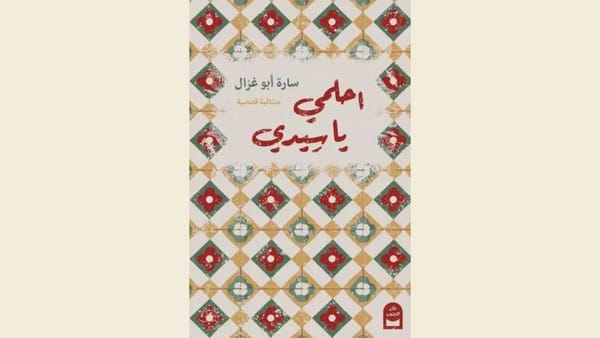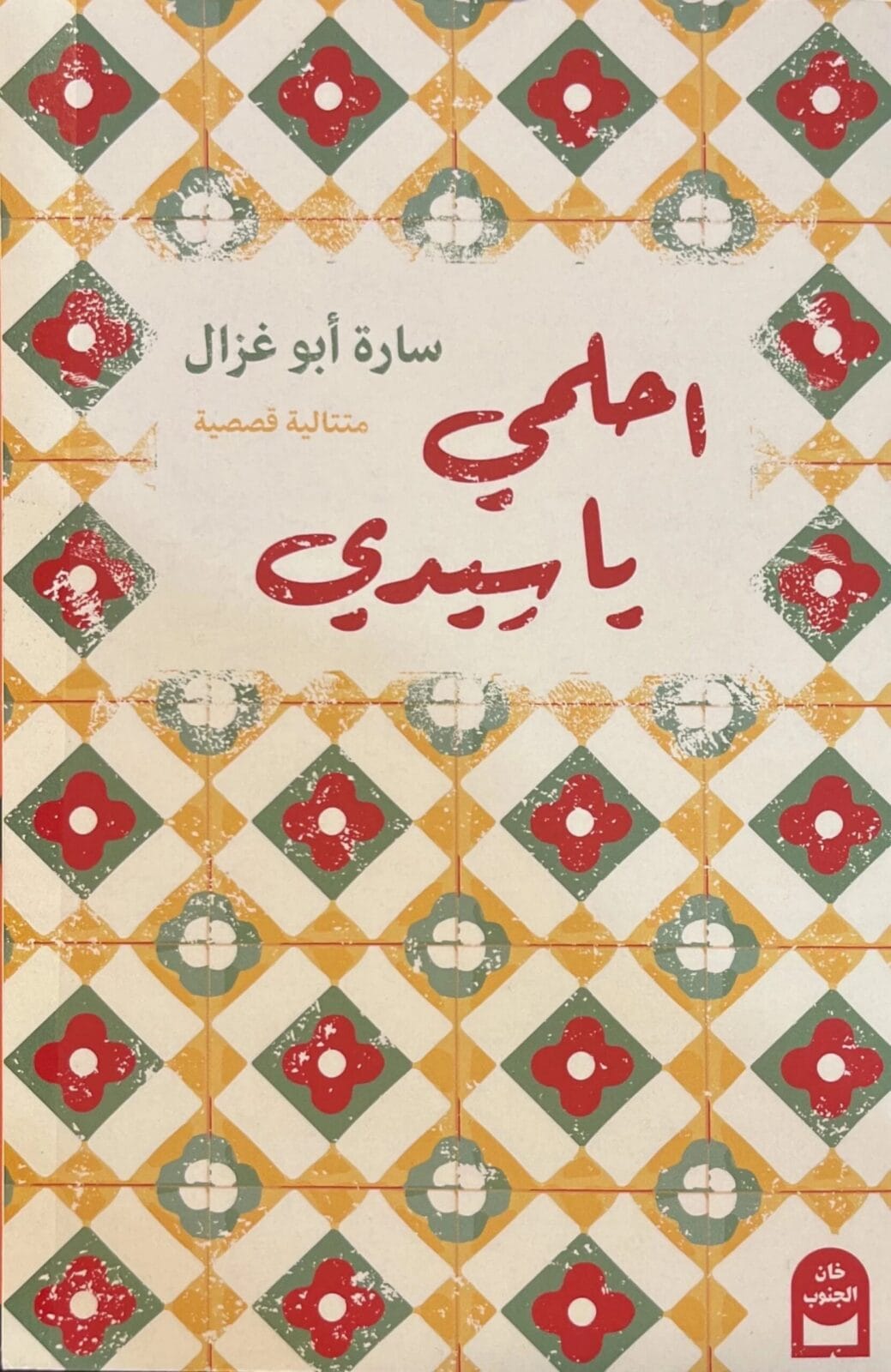'Dream, My Grandchild'—An Interview with Sara Abu Ghazal



[su_dropcap style="simple" size="4"]I[/su_dropcap]n September of 2023, Roba AlSalibi interviewed Sara Abu Ghazal, a Palestinian writer and feminist activist about her Arabic short story collection, Dream, My Grandchild. The book uses multiple voices to chronicle the story of the Abu Sukkar family, originally from the north of Palestine. Following the killing of Mohammed (the patriarch) and the Zionists' theft of their village, Zahra and her son Zain are forced into exile, leading the family to Beirut. Beginning in Shatila camp, the narrative moves between Lebanon and Palestine, the past and present—with their initial displacement serving as the narrative’s cornerstone. The interview was conducted in Arabic. It has been translated by AlSalibi and edited for length and clarity.
Roba AlSalibi: Your short story collection Dream, My Grandchild follows the Abu Sukkar family who were exiled from Palestine in 1948 and lived in Lebanon as refugees. You brilliantly employ different narrative voices to talk about what the Nakba and exile mean for Palestinians and how they shape our relationship to the past, present and future. My first question is about time in your stories. Each narrative unfolds in a non-linear yet interconnected manner, woven through the experiences of the Abu Sukkar family's members. Can you say more about this?
Sara Abu Ghazal: Time is central to us as Palestinians because the Nakba did not only steal our land and our homes but our future. It’s something that I have never been able to get over on a personal level: how a whole nation was born with the possibilities for their future already confiscated.
It was important to me while working on the story’s characters, like Zain, Nidal and Zahra, who represent different political eras of Palestinians’ existence as refugees in Lebanon, to go back in time to the grandparents—to the dream or the time of possibilities. I wanted to write about how Palestinian refugees in Lebanon have been deceived. We are fed big slogans from childhood in the camps, but when we leave the camps, it all fades away. It’s like we are stuck in a time others have moved on from. We try to romanticize our experience and our struggle, but the experience reveals a catastrophe. And so many political changes have happened in Lebanon. It is a post-post-post-civil war to the point Palestinians appear as ghosts of history. I wanted to reflect on our time in the refugee camps in Lebanon. How, first, people lived on the grass, then in tents and homes with asbestos roofs and later in homes made with cement. All these things are about time.
Roba: Another theme that appears in the collection is that of space and belonging. Shatila camp in southern Beirut is a central place in the Abu Sukkar family’s story. Zahra and her son, Zein Al Abdeen, lived as refugees there until Zein’s marriage, when the family moves to the New Road in Beirut city. Shatila camp and Beirut have a relationship fraught with tensions and contradictions, which you allude to throughout the collection. Would you speak a bit about this?
The camp is an enduring presence in Beirut, but what changes is the city’s relationship to it.
Sara: It is a strange relationship. Beirut is, I don’t want to say cosmopolitan, but an Arab city that had a certain historical and political role in our region, in which Lebanese and non-Lebanese were invested. It had a margin of freedom. It is now a different city. I also don’t like to say that Palestinians’ relationship to Beirut started with the Palestinian resistance in the 1960s. Rather, it started when Palestinians built the Shatila refugee camp in 1949 on the lot of Shatila in Beirut. The camp was controlled by the state, but Palestinians created a space for themselves there. They also did this in the Mar Elias and Burj al-Barajneh camps. These camps came to be part of the broader landscape of Beirut. Look at Palestinians’ relationship to the neighborhoods surrounding Shatila camp, like Sabra market, for example, which occupies a whole street. There were always deep relations between us. But things changed during the 1990s, and these relations were deliberately targeted. Increasingly, a link was drawn between Palestinians and crime, disease, laziness—a systemic demonization of us. After Hariri was killed in 2005, they said that a Palestinian did it. It’s actually impressive how many relations remained as strong as they were in the face of this demonization. People lived together through a civil war, and some got married to each other. Today, the Lebanese state is collapsing, and because of the scarcity of resources, divisions between Beirut city and the camp have grown deeper. The camp is no longer part of the everyday life of the city. The camp is an enduring presence in Beirut, but what changes is the city’s relationship to it.
Roba: You have also described Dream, My Grandchild as a feminist literary work. What defines feminist literature for you? How did you employ your own understanding and experience of feminism in writing the book?
Sara: I think of Dream as a feminist work because it articulates things that are prohibited and exposes patriarchal power. Patriarchy lacks both ethics and logic. It only wants to maintain its existence. I made a conscious decision to collude with the female characters against patriarchy and write in a subtle way about the sense of solidarity among them. As the author of the story, I wanted to show the complications of family relations and of power dynamics in the small details and battles of everyday life. I wanted to portray a specific image of the father that amplifies how patriarchy refuses to acknowledge different narratives, through having the same story and moment re-told by different characters. I also think of Salim’s character as a way for me to portray how masculinity approaches solidarity and liberation.
Roba: I have a question on the role that memory plays in the life of the characters, especially Salwa (Zain’s daughter). Salwa sees her grandfather, Mohammed Abd Wahab, in her dream, and he tells her about their home in Palestine and the story of their displacement. He wants her to remember and dream of Palestine because memory is “[the Zionists] first enemy. They know we continue to exist through it.” (100) As a Palestinian refugee in Lebanon, what does memory and remembering mean to you?
Each of us could tell our story of the Nakba, and we would understand our collective experience of a moment that fragmented and ripped us apart.
Sara: The question of memory for Palestinians is a question of who we are. We always go back to the Nakba and remember it because it is the moment that explains why we do not live where we are supposed to live. Memory is an individual history of a home, land and social relations. These histories shape our individual trajectories but also our collective memory and how we understand ourselves as a nation. Each of us could tell our story of the Nakba, and we would understand our collective experience of a moment that fragmented and ripped us apart. There is something empty inside us as a result of this fragmentation. We call ourselves a nation, but we do not have an experience of a nation. We have collective memories and an ambition and a longing to be one.
Roba: The Palestinian collective memory, centered on the Nakba, holds forms of tension and silences that makes remembering a difficult process. For example, the cases of sexual violence against Palestinian women is not something that is widely spoken about in our collective narrative of the ethnic cleansing of Palestinians by Zionists. How do we recognize the multiplicity and diversity of Palestinian experiences in 1948?
Sara: Collective memory is about what we are allowed to remember. Sexual violence is alluded to only in whispers in my work. Some prominent work has been done recently on sexual violence and where it stands in our collective memory and narrative like Adania Shibli’s Minor Detail. The question is to what extent are we allowed to remember. For women, we carry the memory of what is not spoken about. I think there is a collective memory and a clandestine one, which includes shame. When I think about my grandfather—I don’t know if we will ever meet in the afterlife—but if I could speak with him, I would tell him that I know he felt shame but that it wasn’t his fault. All that happened to us does not say anything about us. We are not the problem. It was violence that we have been subjected to.
Roba: Speaking of the afterlife, through the voice of the grandfather, Mohammed Abd Wahab, you narrate the story of the Nakba from the perspective of those who were killed at the hands of the Zionist militias. He tells the story from the afterlife to say that the dead are still part of the Nakba, that the sky “cannot force us to have a life after death as if nothing had happened…because all of these things cannot be forgotten.” (119) This narration of the afterlife is something that I have not come across before in Palestinian literature. Can you tell us more about what you were hoping to say through the voice of the grandfather?
Sara: I wanted to say that the Nakba was a tragedy to the extent that the earth will not revolve again in a normal way until Palestine is liberated. I wanted to say that our death does not mean our absence or an end to our story, as if nothing had happened. We do not disappear. I also wanted to say that, from our ancestors to the generation that will return, we are united. The fragmentation imposed upon us will not remain.
Read the previous article.
Read the next article.
This article appears in MER issue 309 “Palestine—Before and After October 7.”








